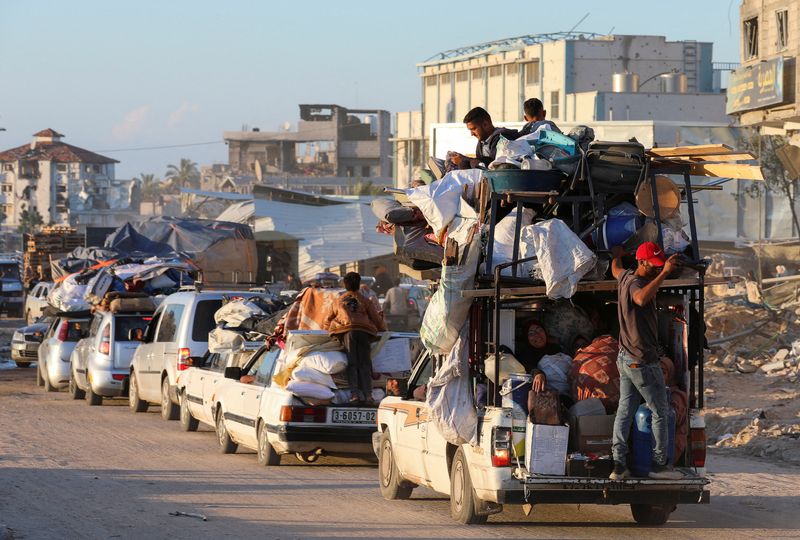(Reuters) -Palestinian Islamist group Hamas said on Monday it had agreed to a three-phased deal for a ceasefire and hostages-for-prisoners swap, although an Israeli official said the deal was not acceptable to Israel because terms had been "softened".
The United States, which alongside Qatar and Egypt has played a mediation role in the talks, said it was studying the Hamas response and would discuss it with Middle East allies.
Based on details announced so far by Hamas officials, a copy of the proposal and an official briefed on the talks, the deal that the Palestinian group said it had agreed to included the following:
PHASE ONE
- 42-day ceasefire period
- Hamas freeing 33 Israeli hostages, alive or dead, in return for Israel releasing 30 children and women for each released Israeli hostage, based on lists provided by Hamas according to the earliest date of detention.
- Starting from the first day of the ceasefire, the entry of intensive and sufficient quantities of humanitarian aid, relief materials, and fuel (600 trucks per day, including 50 fuel trucks, of which 300 are for the north), including the fuel necessary for operating the power plant, trade, and equipment needed for rubble removal, rehabilitation and operation of hospitals, health centres and bakeries in all areas of the Gaza Strip, and the continuation of this in all stages of the agreement.
- Hamas will release three Israeli hostages on the third day of the agreement, and then release three more hostages every seven days, prioritising women if possible, including civilians and conscripts.
- In the sixth week, Hamas will release all remaining civilian hostages covered by this phase. In exchange, Israel will release the agreed number of Palestinian prisoners in Israeli prisons, according to the lists that will be provided by Hamas.
– Israel partially withdraws troops from Gaza and allows the free movement of Palestinians from south to north Gaza.
- Cessation of military flights over the Gaza Strip will take place for 10 hours per day and 12 hours on the day of releasing the hostages and prisoners.
- On the third day after releasing the first Palestinian prisoners, the Israeli forces will completely withdraw from al-Rashid street in northern Gaza, and all military sites will be dismantled.
- On the 22nd day of the first phase, Israeli forces will withdraw from the centre of the strip, east of Salah al-Din road to an area near the Israeli border.
PHASE TWO
- Another 42-day period that features an agreement to restore a "sustainable calm" to Gaza, language that an official briefed on the talks said Hamas and Israel had agreed in order to take discussion of a "permanent ceasefire" off the table.
- The complete withdrawal of most Israeli troops from Gaza.
- Hamas releases Israeli reservists and some soldiers in return for Israel releasing Palestinians from jail.
PHASE THREE
- The completion of exchanging bodies and starting the implementation of reconstruction according to the plan overseen by Qatar, Egypt and the United Nations.

- Ending the complete blockade on the Gaza Strip.
- Start of the implementation of a 3-5 year plan for reconstruction of the Gaza Strip, including homes, civilian facilities and infrastructure, and compensation for all those affected, under the supervision of a number of countries and organisations including Egypt, Qatar and the United Nations.